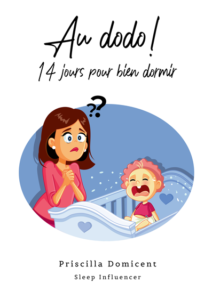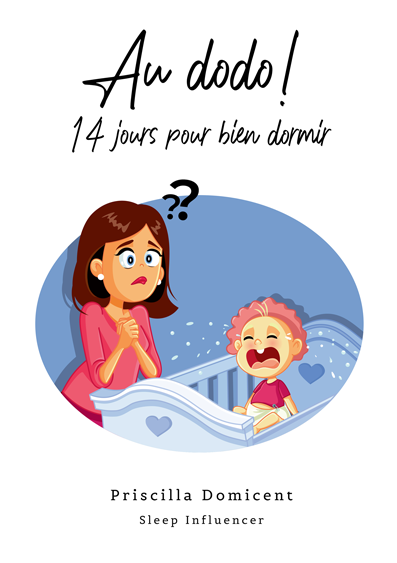I can’t recall the number of times I have heard parents blaming teething for their baby’s sleep disruptions; there have been so many cases. Yes, teething can be painful and cause nighttime wakenings. However, teething is rarely a routine buster. Teething can definitively interfere with your baby’s sleep, but far less than what you probably anticipate or believe.
Babies go through many milestones in their first year of life. One of the biggest is teething. Teething starts even before you see a tooth poking out of your baby’s sweet smile. She should get 20 milk teeth in total between the age of 6 and 30 months (but some babies are born with teeth!). So, if the eruption of each new tooth causes you on average 3 to 5 sleepless nights, you should be expecting to have about 100 disrupted nights in 2 years’ time!?!?!? Luckily, this is rarely the case! Sometimes, parents do not even notice that a new tooth erupted until their child smiles.
By identifying the physical and behavioral signs, you know when your baby is teething. You can then provide her with relief from any discomfort related to cutting teeth and ensure that she will benefit from good nights of sleep.
What are the signs and symptoms of teething to look for?
Since babies are different little individuals, there is not a unique list of signs and symptoms that applies to all of them. So, the tricky part is that there is not a single set of teething signs and symptoms. However, to give you an idea of the possible teething indicators to look for, here are the most common ones:
- (excessive) drooling
- red, swollen, bulging gums
- visible tooth below the gum
- more irritable than usual
- (excessive) biting, chewing, and sucking on everything that is at hand
- flushed cheeks
- rubbing her face
- loss of appetite
- grabbing or pulling her ears
- sleep disruptions
- fever
- diarrhea
- painful diaper rash
Thanks to a French documentary, I recently discovered why teething can trigger diaper rash. It is said, with a reasonable certainty, that when erupting, the tooth slices flesh and damages the mucous membranes. Microbes then multiply around the lesion. These travel from your child’s mouth through her little body and finish their journey in her stools, making them more acidic and corrosive for her bottom.
How long does a teething period last ?
Teething is a different experience for every child. Just as it is impossible to predict when a baby’s first tooth will appear, no one can know how long a teething phase could last. Some babies are bothered for a couple days, right around the time a new tooth is emerging. Others suffer from several unpleasant symptoms for weeks if a lot of teeth come through at once. The pain usually fades as soon as a tooth breaks the skin.
The discomforts associated with teething reach the climax with the arrival of molars. These are located in the back of the mouth and appear between the baby’s first and second birthday.
How to know if teething is disrupting your baby’s sleep
Surprisingly, the answer to this question is very simple. Observe your baby’s mood. In addition to the above-mentioned physical symptoms of teething your baby should also exhibit behavioral signs.
To understand if the teething process does result in sleep disruption, compare your baby’s day and night behaviors. Is she her usual self all day but extra cranky or difficult at night? In such case, the teething can’t really be blamed for causing major sleeping issues.
On the contrary, if a usually cheerful baby is miserable around the clock, the trouble may come from teething. Your baby may seem fussier than usual or even irritable despite your attempts to comfort her. She does not find it easy to ignore the pain during the day and finds it even more bothersome when lying flat. The period before molars come through can especially bring discomfort because your baby may feel extreme pain.
Since tooth eruption happens mostly at night, the teething process can disrupt your baby’s ability to sleep. This is also true during naps due to the horizontal position. Therefore, the level of fussiness can get worse when your baby is lying in bed. It can then become a vicious circle; disrupted sleep from teething can cause or increase your baby’s irritability or fussiness.
In addition, pay attention to your baby’s cries. Are the tears rolling down her face more frequently than usual the last few days and nights? Excessive crying can also be a sign of gas, colic, or other medical conditions such as an ear infection. Should you have any doubts about your baby’s health, schedule an appointment with your pediatrician.
Also, because teething can cause discomfort in her mouth, your baby’s eating habits or patterns may change. Your child could experience a loss of appetite and balk at eating anything. If she refuses to eat, check with your pediatrician that there is no other underlying reason that might affect her passion for food.
In a nutshell, if your baby is irritable, excessively crying, eating less and showing physical signs of teething during the day, she is probably ready to cut teeth. You are then entitled to blame teething for her night wakenings.
Now, the challenge is to find efficient ways to help soothe your teething baby.
How to help your teething baby
There are many ways to relieve your child from the pain without having to rush to the pharmacy to get medecine. You could try the following non-medicated solutions.
During the day:
- Offer liquid food such as mashed potatoes, puddings or soup that are easier to swallow.
- Serve cold or frozen pieces of food. These will act as an anesthetic on your baby’s gums.
- Make her favorite dishes because she needs extra comfort.
- Give cold water.
- Give her a frozen wash cloth, a silicone or gel-filled free-of-harmful-chemicals teething toy. Thanks to the biting, the pressure on the gums soothes the pain.
- Gently massage her sore gums to calm the pain temporarily.
- According to Dr. Harvey Karp, “a little lovey and good, rumbly white noise are usually all you need to distract your baby and help her sleep right though crummy-feeling gums.”
- Give a lot of cuddles; parents’ arms are the most comfortable place in the world.
At night:
- Maintain the bedtime routine to give your child the opportunity to relax and get the security needed.
- Create a peaceful sleep environment.
- If your baby is fussing a lot and becomes hysterical, pick her up. Try not to break the established positive sleep habits as it may be difficult to get back on track once the teething is over. Do not let her fall asleep in your arms. Put her back in bed drowsy but awake.
Pain-relieving medicated options can also soothe sore gums. However, even if you can get over-the-counter medicine, talk to your pediatrician first. In fact, your little one might be suffering from another condition such as an ear infection, sometimes generating similar symptoms to teething.
The most recommended options are usually Tylenol and Motrin. If your baby is older than six months, you could give her a dose of ibuprofen or acetaminophen. Since the dosage and frequency of administering a painkiller are extremely important, don’t forget to get related instructions from your child’s doctor.
In 2011, the U.S. Food & Drugs Administration has reported “a rare, but serious and potentially fatal adverse effect with the use of over-the-counter benzocaine gels and liquids (such as Anbesol, Hurricaine, Orajel, Baby Orajel, Orabase and store brands) applied to the gums or mouth.”
Treat each symptom individually. Unfortunately, figuring out what works for your baby can be a matter of trial and error. Schedule an appointment with the pediatrician if you are worried about your child being in too much pain.
In addition, do not forget to brush your child’s teeth. As soon as the first tooth appears, give your child the opportunity to adopt a great oral hygiene. Take the initiative to include teeth brushing as part of her daily bedtime routine. Also, ask your pediatrician when your baby’s first appointment should be scheduled with a pediatric dentist.
On a final note, you do not need to wait to start sleep coaching your child until all 20 teeth popped out. You could start the process as soon as your baby has reached 18 weeks. However, it is recommended not to initiate the sleep coaching process in the middle of a teething episode. Since teething happens on and off for many months with some breaks in between tooth eruptions, you should wait until a teething phase is over and the discomfort is gone.
If you would like to get more information on how to improve the quality and/or the quantity of your child’s sleep (and yours at the same time), do not hesitate to schedule a 15-minute preliminary consultation. It is a totally FREE & NON-BINDING offer!










